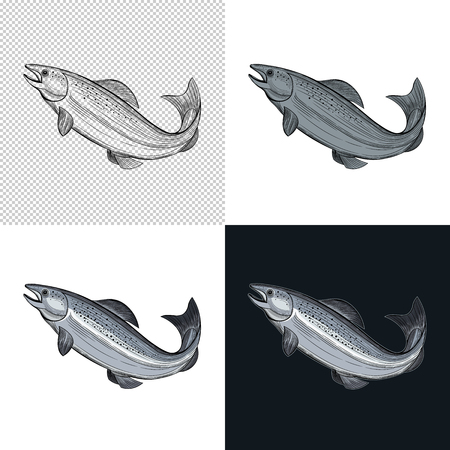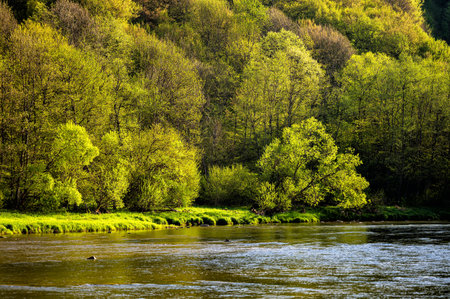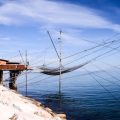Introduction to Fly Fishing in Wales
For generations, fly fishing has been woven into the fabric of Welsh countryside life, standing as both a beloved pastime and a celebrated tradition among British anglers. The rolling hills and lush valleys of Wales are crisscrossed by some of the UK’s most picturesque rivers—each with its own unique character, teeming with wild trout, grayling, and the occasional salmon. From the fast-flowing waters of the River Usk in the south to the tranquil stretches of the Dee in the north, these rivers have shaped not only the landscape but also the identity of local communities.
The Welsh approach to fly fishing is steeped in respect for nature and an appreciation for subtlety and skill over brute force. Anglers here often speak of ‘reading’ a river, learning its moods and secrets through years of experience—a sentiment that resonates deeply with both beginners taking up their first rod and seasoned experts refining their technique. Fly fishing lodges across Wales serve as gathering places where stories are swapped over hearty meals and a pint of local ale, creating a sense of camaraderie that’s hard to match elsewhere.
Wales holds a special significance within the wider British angling community. Its rivers have hosted countless competitions and inspired classic literature on the art of fly fishing. Many British anglers consider a trip to Wales a rite of passage, drawn by tales of elusive wild fish and breath-taking scenery. Whether you’re seeking your first brown trout or aiming to land a trophy catch, fly fishing in Wales offers an experience rich in both challenge and reward—a perfect blend of sport, heritage, and natural beauty.
| Key Welsh Rivers for Angling | Main Species | Notable Features |
|---|---|---|
| River Usk | Trout, Salmon | Renowned for fly hatches; scenic valleys |
| River Dee | Grayling, Trout | Famous for winter grayling; historic towns nearby |
| River Teifi | Sea Trout (Sewin), Salmon | Lush woodlands; excellent night fishing |
| River Wye | Salmon, Trout | Sweeping views; classic beats for all levels |
This proud legacy ensures that whether you’re casting your line for the first time or returning as an old hand, the Welsh countryside promises not just great angling but an immersion into one of Britain’s richest sporting traditions.
2. Key Considerations for Choosing a Welsh Lodge
When planning your fly fishing escape to the Welsh countryside, selecting the right lodge is crucial—whether you’re just starting out or already have years of angling under your belt. Wales boasts a variety of lodges set amidst breathtaking landscapes, but the best options share a few practical features that make all the difference for an enjoyable and successful trip.
Location & River Access
Top-tier Welsh lodges offer direct or easy access to some of the country’s renowned rivers such as the Usk, Dee, and Teifi. Proximity to these waters means less time travelling and more time casting your line in prime habitats. For both beginners and seasoned anglers, being able to step out of your accommodation and onto the riverbank is a real luxury.
Local Expertise & Guided Support
The value of local knowledge cannot be overstated. Look for lodges that provide on-site guides or can arrange expert tuition. A seasoned ghillie or guide can help you read the water, select the right flies, and master local techniques—especially handy for those unfamiliar with Welsh rivers or UK fly fishing etiquette.
Gear Hire & Facilities
If you’re travelling light or new to the sport, having access to quality gear hire is a must. Top lodges will offer rods, reels, waders, and flies suited to local conditions. Additionally, drying rooms for wet kit, secure storage for tackle, and even rod licences available on site are marks of a well-equipped establishment.
Typical Amenities Comparison Table
| Lodge Feature | Why It Matters |
|---|---|
| Direct River Access | Saves travel time; maximises fishing hours |
| On-site Guides/Tuition | Improves skills; offers local insights |
| Gear Hire Available | Convenient for travellers; ideal for beginners |
| Drying Room/Secure Storage | Keeps equipment safe and ready for use |
| Catering & Packed Lunches | Makes long days by the water hassle-free |
Catering & Comforts
Many Welsh fishing lodges pride themselves on hearty breakfasts and packed lunches—fuel for a full day outdoors. After a day on the river, cosy lounges with log fires or traditional pub fare add that essential touch of rural hospitality. These comforts make your stay memorable beyond just the fishing.

3. Top Lodges for Beginners
If you’re just starting out on your fly fishing journey, Wales offers a variety of lodges that specialise in welcoming newcomers to the sport. These carefully selected lodges are renowned for their accessible waters, expert tuition, and a relaxed, supportive environment—making them ideal for those taking their first steps into the world of angling.
Welcoming Waters and Expert Guidance
The best beginner-friendly lodges pride themselves on having gentle riverbanks or tranquil lakes, perfect for getting to grips with casting without feeling overwhelmed. Many offer tailored introductory courses led by seasoned ghillies or instructors who know how to ease novices into both the technical and traditional aspects of fly fishing. Their patience and passion set the tone for a memorable first experience.
Key Features of Beginner-Friendly Welsh Lodges
| Lodge Name | Water Type | Instruction Available | Atmosphere |
|---|---|---|---|
| Tregaron Trout Lodge | Stillwater & River Teifi | One-to-one & group sessions | Warm, family-run, relaxed |
| Glaslyn Angling Retreat | Llyn Glaslyn (Lake) | Introductory workshops | Welcoming, scenic, inclusive |
| Cors-y-Gedol Fly Fishing Estate | River Mawddach & Private Pools | Bespoke guidance packages | Historic, friendly, supportive |
| Llangorse Waterside Lodge | Llangorse Lake | Taster days & kids’ clinics | Easy-going, community feel |
A Supportive Start to Your Angling Adventure
What truly sets these lodges apart is their focus on comfort and encouragement. From cosy common rooms where you can swap stories over a cup of tea after a day on the water, to flexible tuition that goes at your pace, these venues ensure you’re never left adrift. Whether it’s mastering knots, understanding local hatches, or learning river etiquette—the support here extends beyond the water’s edge. For anyone keen to learn fly fishing amidst the breathtaking Welsh countryside, these lodges deliver both skill-building and unforgettable camaraderie.
4. Recommended Lodges for Seasoned Anglers
If you’re an experienced fly fisher with a taste for the more demanding side of the Welsh countryside, there are several outstanding lodges that cater specifically to your level of expertise. These establishments not only provide direct access to some of Wales’s most challenging rivers and lakes, but also offer advanced guiding services, tailored packages, and exclusive beats reserved for those who appreciate the subtleties and thrill of expert-level angling.
Handpicked Lodges for Experienced Fly Fishers
Below is a selection of lodges that have earned a reputation amongst seasoned anglers. Each option offers something unique—be it technical water, private river stretches, or access to wild brown trout and elusive grayling.
| Lodge Name | Location | Key Features | Exclusive Access |
|---|---|---|---|
| The Dolgellau Anglers’ Retreat | Snowdonia National Park | Guided tours on fast-flowing rivers; casting clinics with local experts | Private beats on River Mawddach & Wnion |
| Tregaron Fly Fishing Lodge | Ceredigion | Challenging upland lakes; wild brown trout fishing; advanced entomology workshops | Exclusive access to Teifi Pools |
| The Tywi Angler’s House | Carmarthenshire | Specialist salmon & sea trout fishing; evening hatch excursions | Private Tywi riverbanks for guests only |
What Sets These Lodges Apart?
- Bespoke Guiding: Veteran guides with intimate knowledge of local waters help you refine your technique and approach to match local conditions.
- Technical Waters: Many of these lodges sit alongside rivers and lakes renowned for their unpredictable currents, wary fish, and varied hatches—a true test even for accomplished anglers.
- Community Atmosphere: Share stories and strategies with fellow enthusiasts in well-appointed lounges or over hearty Welsh fare at the lodge restaurant.
Tried-and-Tested Advice from the Field
As someone who has tackled these waters over many seasons, I can vouch for both the challenge and the reward they offer. Arrive prepared: fine-tune your tackle selection, bring your best dry fly patterns, and be ready to adapt. Most importantly, make the most of the expert guidance available—Welsh ghillies have a knack for unlocking the hidden gems in these storied rivers and lakes.
5. Practical Tips: Making the Most of Your Welsh Fishing Adventure
When it comes to fly fishing the Welsh countryside, a dash of local know-how goes a long way. Whether you’re wetting a line for the first time or you’ve got decades of experience under your belt, blending into the local angling scene and making your trip memorable requires more than just skill on the water. Here are some veteran tips to help you get the most from your Welsh fishing adventure—both on and off the river.
Essential Kit: Packing Smart for Welsh Waters
The Welsh weather is famously unpredictable, so packing right can make all the difference. Here’s a quick checklist for both comfort and effectiveness:
| Item | Why You Need It |
|---|---|
| Breathable Waders | Keep dry and comfortable when wading in cool streams. |
| Waterproof Jacket | Sudden showers are common—be prepared! |
| 4-6wt Fly Rod | Perfect balance for Welsh trout and grayling. |
| Barbless Flies | Required in many beats; easier on fish and fingers. |
| Polarised Sunglasses | Spot fish and protect your eyes from glare. |
| Tippet Selection (2-5X) | Covers various water conditions. |
| Pocket Guidebook/OS Map | Navigate public footpaths and lesser-known pools. |
Booking Advice: Securing Your Spot on Prime Waters
The best stretches of river often require advance booking, especially during peak season (May–September). Many lodges offer package deals with guided days, but if you’re keen to explore solo, check out Fishing Passport, which covers dozens of Welsh beats. Always confirm rod limits and access rules before arrival. For those travelling in groups, early contact with local clubs can sometimes secure access to exclusive waters otherwise unavailable to day-trippers.
Etiquette: Blending In With Local Anglers
- Respect Beat Boundaries: Many rivers operate on a beat system—never poach another angler’s water without permission.
- No Litter Left Behind: Rural Wales prides itself on pristine landscapes; always carry out what you bring in.
- A Quick Chat Goes Far: Locals appreciate a friendly nod or brief chat at the car park—don’t be shy about asking for tips or sharing your own tales.
- C&R is King: Catch and release is widely practised; handle fish with wet hands and release them swiftly.
- Dress Down: Camouflage clothing may seem excessive, but dull colours help avoid spooking wary wild trout.
Beyond the River: Embracing Welsh Culture
Your fishing trip is also an opportunity to soak up Welsh hospitality. After a day on the water, pop into a village pub for a pint of Brains or Felinfoel ale, try traditional dishes like cawl (hearty lamb stew), or catch a local Eisteddfod (music festival) if timing allows. Many lodges will happily point you towards castle ruins or scenic walks nearby—ideal for non-angling partners or rest days between sessions.
A Handy Summary Table: Key Dos & Don’ts for Visiting Anglers
| Do | Dont |
|---|---|
| Book beats in advance where possible | Trespass onto private waters uninvited |
| Ask locals for advice & directions | Litter or leave tackle behind |
| Praise local catches & stories | Loudly criticise the weather or river conditions! |
The Takeaway from Experience…
If there’s one bit of wisdom I’d pass down from years on Welsh rivers, it’s this: come prepared, stay humble, and embrace both the sport and spirit of Wales. The country’s beauty lies not just in its rivers, but in its people—and that’s what turns a good trip into an unforgettable one.
6. Sustainable Angling and Conservation in Wales
Wales has long taken pride in its pristine rivers and the rich angling heritage woven through its countryside. Today, protecting these waters is more vital than ever, and the Welsh fly fishing community—lodges, local clubs, and visiting anglers alike—are at the heart of a growing movement towards sustainability. Whether you are a seasoned rod or new to the sport, understanding how Wales safeguards its river habitats can enrich your experience and ensure these banks remain bountiful for generations.
Welsh Initiatives for River Preservation
Conservation is not just a buzzword here; it’s a lived value. Organisations like Natural Resources Wales (NRW) and The Wild Trout Trust work hand-in-hand with local angling associations to restore spawning beds, monitor water quality, and remove invasive species. Many lodges have partnered with these groups, offering guests insights into habitat projects and sometimes even opportunities to volunteer.
Catch and Release: Best Practice on Welsh Rivers
To protect native trout and salmon stocks, catch and release has become standard practice on many beats. This isn’t just about returning fish—it’s about doing so thoughtfully. Welsh guides encourage the use of barbless hooks, wet hands when handling fish, and minimal air exposure to maximise survival rates. Most lodges provide clear guidelines for their guests:
| Best Practice | Description |
|---|---|
| Barbless Hooks | Easier removal, less harm to fish |
| Quick Release | Keep fish in water as much as possible |
| No Keep Nets | Reduces stress and injury to fish populations |
| Hands Wet Before Handling | Protects delicate fish slime coating |
How You Can Contribute as a Visitor
Respecting local byelaws is essential—bag limits and closed seasons are strictly enforced. But visitors can go further by supporting eco-certified lodges, participating in riverbank clean-ups (often advertised on lodge noticeboards), or simply spreading awareness of sustainable practices back home. Even small actions—like using biodegradable line or reporting pollution sightings—help keep the Welsh countryside thriving.
The real joy of fly fishing in Wales lies not only in the catch but in the shared stewardship of these magical waters. By following sustainable practices and engaging with conservation efforts, every angler plays a part in preserving the soul of Welsh fly fishing for the next cast and beyond.
7. Final Thoughts: Welsh Hospitality and the Allure of Fly Fishing
Reflecting on my many seasons spent casting lines across Wales, I am always struck by the camaraderie that naturally arises among anglers here. Whether you’re a novice tentatively tying your first fly or an old hand recalling tales over a pint in a riverside pub, there’s a shared respect for both the sport and the landscape that binds us together. The Welsh countryside, with its rolling valleys, ancient woodlands, and crystal-clear waters, offers more than just picturesque scenery—it provides an authentic connection to nature and tradition.
The enduring appeal of fly fishing in Wales lies in its perfect blend of challenge and relaxation. The unpredictability of a sudden hatch on the River Usk, or the thrill of a wild brown trout leaping in Llyn Clywedog, keeps even the most experienced anglers keen. Yet it’s not only about the catch; it’s about the gentle rhythm of casting, the quiet moments lost in thought beside a misty lake at dawn, and the warm welcome found at every local lodge.
Welsh hospitality stands out as much as the fishing itself. Lodges across Wales—from rural retreats near Bala to family-run guesthouses in Brecon—pride themselves on genuine warmth and practical advice. For those unfamiliar with what to expect, here’s a quick comparison:
| Lodge Feature | Beginner Anglers | Expert Anglers |
|---|---|---|
| Guided Sessions | Comprehensive tuition & kit hire | Advanced river tactics & local insights |
| Accommodation Style | Cosy rooms, hearty meals | Bespoke packages, private cabins |
| Community Atmosphere | Group lessons & social evenings | Quiet retreats & exclusive access |
| Local Advice | Beginner-friendly water spots | Hidden gems & challenging beats |
No matter your experience level, there is something magnetic about the Welsh angling community—a mix of story-swapping around log fires, friendly competition on the water, and a deep-rooted appreciation for conservation. Fly fishing in Wales is not merely a pastime; it’s an invitation into a way of life where patience is rewarded with both fish and friendship.

